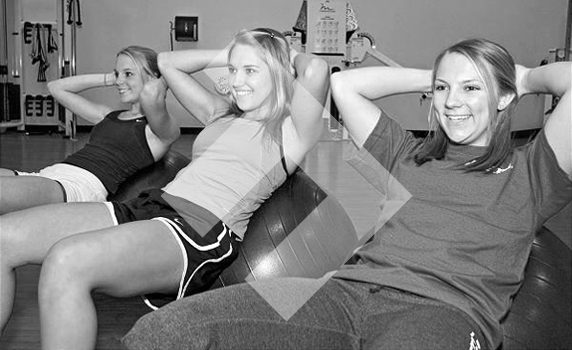The obesity crisis has long been associated with adults making poor nutrition choices and living an unhealthy lifestyle. Even though this is still the case, more and more children have now entered the equation, which raises serious concerns about their future. In “Overweight in Children”, published by the American Heart Association, obesity is said to be causing a broad range of health problems in teens and children such as high blood pressure, type 2 diabetes, and elevated blood cholesterol levels. Obese children are also more prone to low self-esteem, negative body image, and depression. Fitness is the answer to a healthier lifestyle, but with the vast amount of information available, it is easy for teens as well as parents to get lost and overwhelmed. This article will try to shed some light on the matter.
When it comes to fitness there are many exercises teens can do to build a strong and fit physic. First you need to have a goal and know what you want to achieve from an exercise program. As far as exercises are concerned, a certain amount of strength should be built before considering weight lifting. Teens should focus first on bodyweight exercises such as push-ups, pull-ups, squats and crunches in order to build their strength. These exercises will be safer for them and they will be less prone to injuries. In “Should Kids Lift Weights” from Men’s Health News, fitness adviser Michael Meija raises the point about injuries. “People put too much focus on popular exercises like bench press and start pilling on weight before a kid can do 10 good pushups, that’s a recipe for injury”. Teens should focus on building up their strength and developing good form through simple bodyweight exercises.
The other important aspect teens should address in their quest to good fitness is their nutrition habits. I am an avid proponent of employing a synergistic approach to fitness between healthy eating and exercising. When it comes to healthy eating, certain foods should be cut back or simply eliminated from their diet all together. Sugary soft drinks, cola, pops, refined sugars, sweets, fast foods should be cut from their diet in order to reach peak health, as these food are nutrient depleted and high in calories. Foods such as whole grains, nuts, lean meat, dairy, and fresh fruits and vegetables should form the staple of teens’ nutrition, these foods are rich in vitamins and nutrients that will not only aid in their fitness goals but also support their development.
Only when a healthy diet is achieved should supplements be introduced into the picture. The supplement industry is filled with many different products and some of them can be dangerous and harmful if taken unsupervised. Because of the physical activity that they engage in, teens need to be able to get adequate nutrients that will aid in their recovery, and protein is one of them. A protein supplement can be taken in order to meet their daily requirements but it’s not necessary if their diet provides them with all the protein they need. Also, a multivitamin can help make sure that all their micronutrient needs (vitamins and minerals) are met. I would advise to stay away from testosterone boosters and prohormones. As Julie Deardorff and Jared Hopkins put it, in “Teens and Supplements” published in the Chicago Tribune, these supplements have been linked to prostate cancer, and side effects include male breast development, heart problems, and hormonal changes in both men and women.
By making some simple lifestyle changes as highlighted earlier, incorporating bodyweight exercises, cutting back on the processed foods and substituting them with whole grains, lean meats and fruits and vegetable any teen can build a fit and strong physic thus improving their overall health.
![]()
This article was written by Oliver Perodin on behalf of AstroNutrition is a premier supplier of sports nutrition and other dietary supplements, a community of healthy living advocates and an educational source for fitness enthusiasts. Check out our blog and join the conversation!
 Instagram
Instagram Pinterest
Pinterest Facebook
Facebook Twitter
Twitter YouTube
YouTube




 Paul
Paul 



